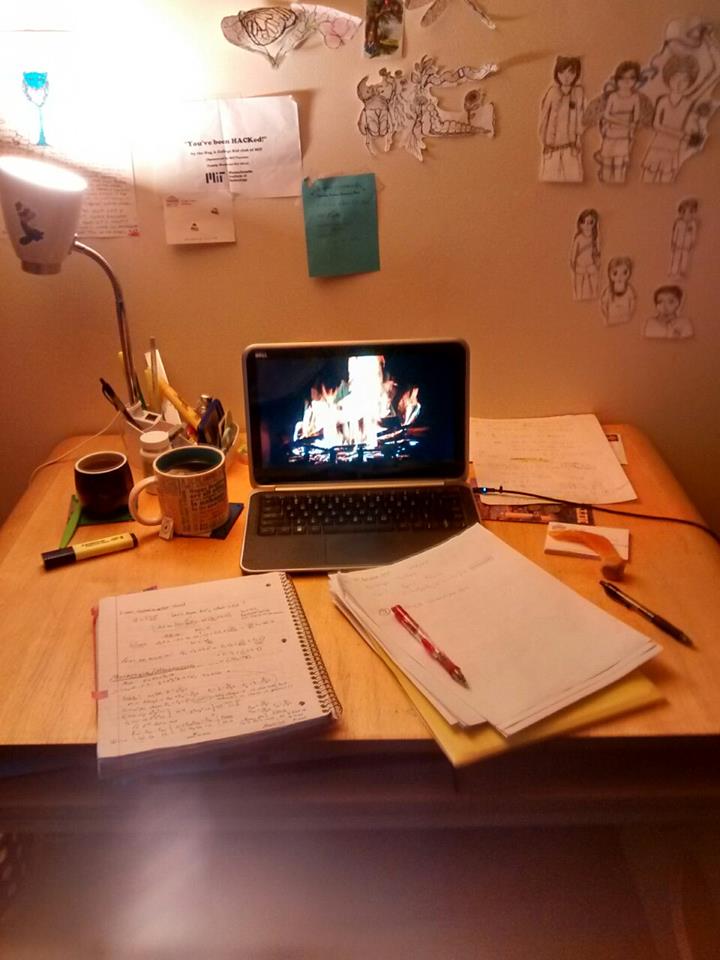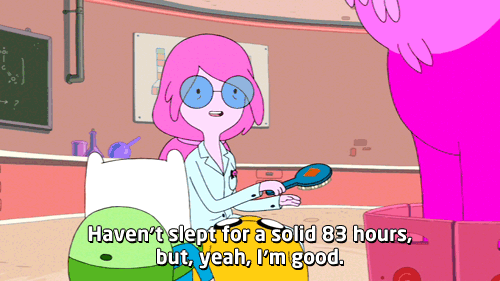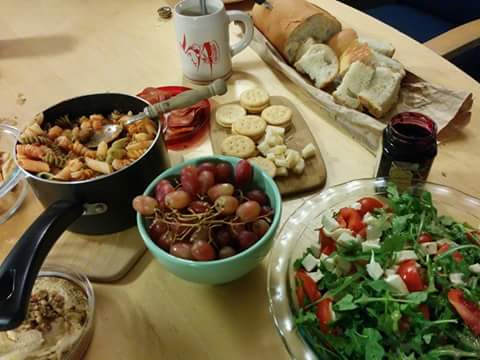Things I Learned From Freshman Year by Selam G. '18
Overanalyzing all my bad habits.
When I’m feeling irritable and/or stressed, I dislike empty advice. I particularly loathe the phrase “work smarter not harder”, probably because it was said to me many times last year by half-hearted well-intentioners who wished to somehow alleviate my IHTFP feelings (then negative) but couldn’t think of better advice. I don’t blame them, certainly, they were just trying to be positive. Still, I don’t believe in blanket statements. I like details, caveats, and qualifications. I like taking a little bit of this and that and putting it together into what works for me. I hate those cliche commands–”Work smarter not harder” “Be more focused” “Be more efficient”–because they never tell you how to do any of that, and though the sentiments behind those goals are good, I’ve never found them actually very helpful.
Summer is a good time for planning and reflection. My nerdy corner of Tumblr is where I put a lot of this reflection. In particular, I seem to have an obsession with productivity for the pure sake of productivity, analyzing and re-analyzing my personal behavior, and, as can happen anywhere on the internet, I was surprised in the last couple years to find an entire niche community of people–called “studyblrs”, and consisting largely of college students–that had created a space for expressing this obsession, among other study and work-related pursuits.
When summer began, I saw a lot of “Things I learned from college” posts from other college student “studyblrs” on tumblr, and I applaud them for being very specific–I once saw a list of sixty-six individual items that were all pretty detailed. But that being said, we’re still all a little different–which is why you can never have too many of those posts, I think. This was my own little contribution, and I have since modified and added to it for the blogs. I hope that people might glean a new procrastination-combatting tactic or two from it, and learn from my own mistakes.
(Note: Of course, there were many more important and personal revelations that occurred after freshman year of college that you might think should be included in this post, but what’s included here is simply an obsessive analysis of my habits and how I might change them. Indulge me.)
Studying/Academic Work

(^how to make studying for finals in December cozy)
I have had ADHD since I was a small child. I’ve now (presumably) grown out of it, to the point that for a time I wondered if my diagnosis had been false. After a lot of personal reflection and research (and realizing I trusted my doctor immensely) I realized that it was definitely not false, and what’s more, some of the effects still linger. I have tried, in the past year, to constantly evaluate and re-evaluate my work habits. Instead of fighting against my own strange idiosyncrasies with traditional studying or work techniques, I decided to allow them to exist, work around them, and hopefully take advantage of them. Most importantly, this involves realizing what they are.
I noticed that the following occurs when I am very stressed/tired/etc., since it is the behavior I exhibited during the end of finals when I was already burnt out, but still needed to cram. Some of it is rather odd, but there you have it. Since this is the case at an extreme, I hope that if I take action in accordance with these behaviors even when I am not as worn out, my productivity levels will increase.
- I work best in 2-hour intervals, preferably there is a change of location between each interval (e.g., library→coffee shop→library→home)
- When I am feeling exceptionally tired and unproductive, I should just give in and sleep/nap. This will make me more productive later.
- I work best in the early morning or the evening, I work worst in the afternoon (around 2-6pm)
- If I have a whole day to work, regardless of when I go to bed I should just get up early and then take a nap in the afternoon, because getting up later than 7:30AM throws me off (in the spring time that is; this is probably a different time interval for the fall/winter when the sun rises later)
- Although I enjoy listening to music while studying, I work best when I do not listen to music. The best sound environment is the library, or a cafe when quiet, around other people working. Sometimes, music is good to start my work, because it makes me feel less stressed and more comfortable, but as my concentration mounts it’s best to turn it off.
- Other people working influences me to work. This is why libraries and cafes are good environments.
- I do not work well in my own room/home.
- The worst work environments are:
1. by myself in my own room anytime before 10pm.
2. around other people not working/only sort of working/talking/etc.
- Physical movement is the best break (walking from one location to another, stretching, taking a walk, doing ab exercises, etc.) Watching things/writing distracts me for too long a period of time.
- If I am feeling particularly lazy, it helps to find someone disciplined/equally worried about the next test or assignment/etc. to work with. We can then explain things to each other without distracting each other.
- In Hayden library, although I like the window seats, I work best at the long outlet tables, preferably when other people are working there.
- The best way for me to study/work is to first organize information and then problem solve/do examples. If I try to do this in reverse order I get easily discouraged when a problem is hard. Passive studying first, active studying second, but in short blocks of passive-active, passive-active, passive-active, by subject material.
- When I feel overwhelmed when studying (all the time) it is best to first make a study plan, whether I follow it or not. A study plan involves writing down all resources, practice exams or problems, available notes and relevant topics. I can organize these into what will help me most and/or what I should do first. Making a plan calms me down and allows me to focus.
Sleep

- Ideally, I would always get 7 hours of sleep a night.
- More often I get about 6 hours of sleep a night. This is doable for the week, but I have to rest well on weekends.
- If there is a test the next day, I have to get at least 6 hours of sleep the night before.
- If I get 5 or fewer hours of sleep, I have to get 7+ hours the next night.
- I have to wake up before 8:00AM at the latest, or else I am significantly less productive the rest of the day.
- Classes after 3pm are hard to sit through; it is preferable to start early and end early.
- I usually cannot work efficiently after 2AM if I am problem solving or studying
- If I am writing a paper, I cannot work efficiently after 4AM.
- Naps are great. Take them, but not for more than an hour.
Food

(^my roommate and I killed the cooking game over IAP)
- Breakfast should be light and late. Eating too early makes me hungrier the rest of the day, and there’s no point in forcing my metabolism to start up before it’s ready.
- Lunch or dinner should also be light, and potentially split into twice a day or interspersed throughout the day.
- Eating less food but more frequently is most effective; I usually feel awfully tired or uncomfortable after a full meal.
- It’s important not to drink coffee too regularly. When there’s a less stressful week of work, take a detox (no coffee or even tea the whole week). This will also keep smaller amounts of caffeine more effective when you do drink it.
- If you’re hungry late at night, go ahead and eat to maintain your energy, but try to eat fruit or nuts or yogurt or something healthier. Drink lots of water with it.
A Note on Food: college students (and most definitely MIT students) usually have a less regular schedule, and often longer days. We don’t wake up at 8 and sleep at 8 every day–if you do, you’re very on top of things, but it’s my belief that you don’t have to do that to be on top of things, especially if, like me, you know that’s never gonna happen. People say this irregular schedule contributes to the Freshman 15, but I don’t think it has to.
Rather, pay close attention to when you get hungry. Throw away social norms, and just plan to eat whenever and how often you get hungry–frequently, but in smaller amounts of healthier food. If you always get hungry at midnight, consider splitting your dinner into two parts, or just eat later, or plan for healthy night snacks. If you are always hungry every four hours, bring granola bars or whatever to class. Drink lots of water, especially late at night and whenever you’re tired.
Next year, I’m going completely off the meal plan and cooking for myself, so I’m trying to get a really good idea of exactly what my needs are, for my own health….and the health of my bank account. I hope to get on a path toward more self-sustainability. Here goes nothing!